The Passive-Aggressive Partner
Passive – aggressive behaviour destroys relationships.
Passive – aggression is a deliberate and masked way of expressing covert feelings of anger.
This pattern destroys the integrity of a relationship and is one of the hardest patterns to transform.
Path of least resistance.
Healthy marriages have patterns of passive – aggressiveness from time to time.
To avoid unpleasantness, a person may say yes to a request when they would prefer to say no. You verbally agree, but delay completion or carry out the task to an unacceptable standard.
Okay if this happens periodically.
A little defiance followed by awareness and a course correcting self-reflection is the standard in solid relationships. You know that you can do better and you turn it around.
Ingrained personality type.
This is a big problem for your relationship as unchecked, unconscious anger is confusing and crazy-making.
The chronically passive – aggressive person expresses anger through such indirect means as procrastination, sulking, “forgetting” and intentional inefficiency.
When a child is raised in an environment where the expression of angry feelings is not tolerated or complete, unquestioning compliance is expected, he learns to use indirect, passive aggressive means to express himself.
In a grown up relationship, your partner overgeneralizes and responds to you as if you were the parent who stifled his emotional expression.
Characteristics of the passive aggressive partner:
- Resistance – lack of co-operative spirit
- Procrastination – “forgetting”
- Stubbornness – wilful defiance
- Intentional inefficiency
- Fault-finding pessimism
- Irritable moodiness to straightforward requests for assistance
- Blame – inability to self-reflect
Suggestions for the passive – aggressive partner:
- Become aware of the underlying resentment and anger that is causing the behaviour
- Become aware of your desire to defeat others, get back at them or annoy them
- Become aware of your need to fail to get back at others
- Work on standing up for yourself when it counts
Long term treatment process.
The first hurdle is acknowledgement of these behaviours without defensiveness or rationalization.
This is tough as many clients with this personality type have great difficulty assessing their behaviour.
The key is for the client to see that they are impeding their success personally and often professionally by this way of relating.
Bottom line, a person has to see their behaviour and want to change it.
Couples counselling works when you can self-reflect and take responsibility.
Tags: Behaviour, Relationship Patterns, Resentment
This entry was posted on Monday, January 2nd, 2012 at 8:00 AM and is filed under IMAGO and Relationships. You can follow any responses to this entry through the RSS 2.0 feed. You can leave a response, or trackback from your own site.




